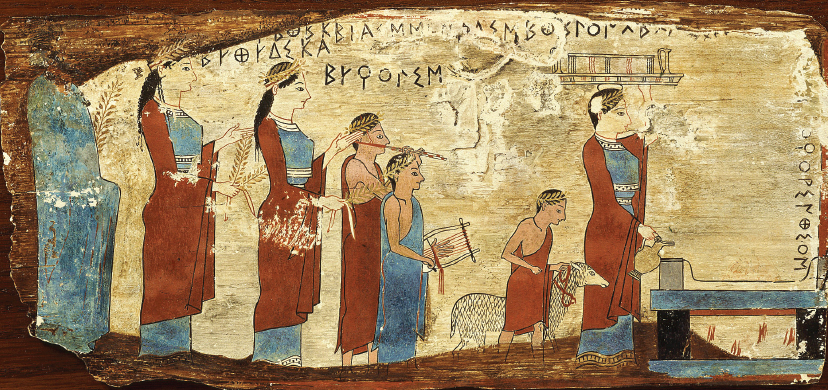Understanding World Societies:
Printed Page 124
> In the classical period, how did war influence Greece, and how did the arts, religion, and philosophy develop?
FFrom the time of the Mycenaeans, violent conflict was common in Greek society, and this did not change in the fifth century B.C.E., the beginning of what scholars later called the classical period of Greek history. First, the Greeks beat back the armies of the Persian Empire. Then, turning their spears against one another, they destroyed their own political system in a century of warfare that began with the Peloponnesian War. Although warfare was one of the hallmarks of the classical period, intellectual and artistic accomplishments were as well.

Religious Procession in Hellenic Greece
This painted wooden slab from about 540 B.C.E., found in a cave near Corinth, shows adults and children about to sacrifice a sheep to the deities worshipped in this area. The participants are dressed in their finest clothes and crowned with garlands. Music adds to the festivities. Rituals such as this were a common part of religious life throughout Greece. The boys are shown with tanned skin and women with white, reflecting the ideal that men’s lives took place largely outside in the sun-filled public squares, and women’s in the shaded interiors of homes. The woman at the front of the procession has her hair up, indicating her married status, while the women at the rear have the long uncovered hair of unmarried women. (Pitsa/National Archeological Museum, Athens, Greece/Gianni Dagli Orti/De Agostini Picture Library/The Bridgeman Art Library)
This painted wooden slab from about 540 B.C.E., found in a cave near Corinth, shows adults and children about to sacrifice a sheep to the deities worshipped in this area. The participants are dressed in their finest clothes and crowned with garlands. Music adds to the festivities. Rituals such as this were a common part of religious life throughout Greece. The boys are shown with tanned skin and women with white, reflecting the ideal that men’s lives took place largely outside in the sun-